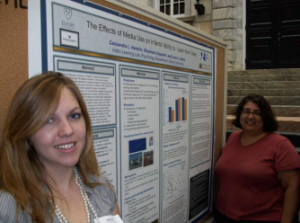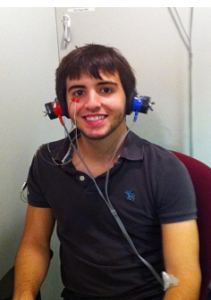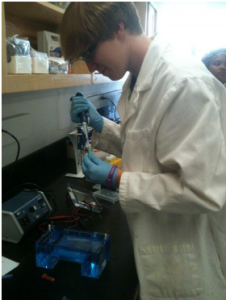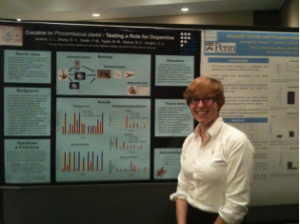The Department of Psychology encourages students to apply for internships to supplement the training they receive at Oglethorpe. Below are three stories recently submitted by OU Psychology Majors who successfully competed for, and completed, prestigious paid summer research internships. Students interested in applying for these or other internships are invited to speak with any of the faculty members in the department for more information.
Cassie Hendrix (’12)
This summer I received an amazing opportunity to participate in the Summer Undergraduate Research at Emory (SURE). After applying and being accepted into the program, Emory University provided me with free housing on their Clairmont campus and a stipend in exchange for my participation in a research internship for 40 hours a week. SURE is designed specifically for undergraduate students who are interested in pursuing a future career in scientific research, so in addition to placement in a lab at Emory, students are given an excellent education in research ethics and information about applying to graduate schools. Every Wednesday following a day spent in the lab, I attended both a program-wide meeting in which we discussed topics related to graduate school and future careers in scientific research, as well as a smaller ethics class containing 6 other students in the SURE program. In addition to doing weekly presentations on various topics relating to research ethics, my class was able to practice presenting our research to our peers, some of whom were familiar with our discipline and some of whom had never taken a class in our respective fields of study.

After being accepted into the program at large, all students were placed in labs whose research matched their specific interests and assigned to mentors who were experts in their fields of study. Given my interest in becoming a child psychologist, I was placed with Dr. Laura Namy, an expert in language development, and began working in her Video Learning Lab. I also worked closely with a post doctoral student, Dr. Shoshana Dayanim, who specializes in media studies. Because there were no graduate students or other undergraduate students working in my lab, I was kept quite busy. It became my job to recruit participants, schedule participants, enter and organize data, observe experiment sessions, and code participant behavior. Additionally, I was able to design and conduct my own study that was related to, but distinct from the overarching study of the lab, which is to determine whether infants between 14 and 16 months of age are able to learn baby signs (which are individual signs taken from American Sign Language) from video as well as they can learn them from parental instruction. My specific research question, however, was whether infants’ ability to learn baby signs from video was influenced by previous screen media exposure (i.e. watching television, DVDs, or videos on the computer). I discovered that parents who allowed their infants to watch large amounts of screen media also reported their infants learning fewer signs than infants who watched smaller amounts of screen media. This finding implies that exposing infants to large amounts of screen media may harm their ability to learn. It is also possible, however, that parents who allow their infants to watch copious amounts of screen media are also less attentive to their children, so they do not notice signs of learning and therefore under-report the amount of sign learning that is actually occurring.
The SURE program concluded with a poster session that allowed all students to create, print, and present research posters to graduate students, faculty members, and various members of the Emory/Atlanta community. Graduate students judged the posters presentations and sent students in the SURE program feedback concerning their specific posters after the conclusion of the program. Over the course of the program, I was presented with an amazing opportunity and asked to continue working in Dr. Namy’s lab during the fall semester. The SURE program became not only a great summer learning experience, but also a fantastic way to develop connections at another university that led to future opportunities!
Justin Sabree (’12)

My summer internship took place both at Georgia State University and at the Atlanta Veteran’s Hospital. Once per week, all of the fellows reconvened at Georgia State and partook in either intensive neuroscience courses or professional seminars about creating curricula vitae and tips for applying to graduate schools. I spent the other four days of each week at the veteran’s hospital researching post-traumatic stress disorder (PTSD).
Due to privacy policies and scheduling issues, I was unable to sit in on any of the interviews with the PTSD participants, but I was able to watch candid video interviews with veterans with combat-related PTSD. These interviews started as the most taxing aspect of my internship but quickly became the most rewarding. In the videos, the veterans vividly detailed their PTSD symptoms and traumas. Though classes prepared me intellectually to expect people with PTSD to suffer from flashbacks, hyper-vigilance, and perpetual insomnia, hearing real people discuss their symptomatology for hours on end emotionally elucidated how much this disorder debilitates even the most stoic people.
In addition to watching the interviews and reading journal articles about PTSD, I learned how to perform and score the Clinician Administered PTSD Scale, or CAPS, which is the standard interview technique used in PTSD research. My mentor also taught me about the techniques used to measure the physiological symptoms of PTSD, such as exaggerated startle responses, and how these research techniques can be implemented in a clinical setting to objectively track patients’ recovery. Ultimately, my internship helped me confirm that I want to study PTSD in graduate school by giving me the opportunity to network with other researchers in the field and to learn both the research techniques and coping skills that I will need to study PTSD in graduate school.
Brittany Weiner (’12)

This summer I completed a fellowship at the Center for Behavioral Neuroscience’s BRAIN (Behavioral Research Advancements in Neuroscience) program. The program has two formats: RightBRAIN and LeftBRAIN. In RightBRAIN, students join a lab of interest and assist with ongoing research projects directed by a mentor. In RightBRAIN, which I was placed in, approximately twenty students work in a single lab with a rotating schedule of researchers. Each week, for the first four weeks of the program, a new mentor taught us novel techniques and tools used to study neuroscience in vertebrates and invertebrates alike. For example, one week of the program was dedicated to the understanding of pharmacology, examining dose-response relationships in crayfish at both the behavioral and molecular level (e.g., performing polymerase chain reactions to duplicate DNA sequences and western blots to identify proteins).
The final four weeks of the program consisted of a group directed research project. Each group was tasked with developing and testing a novel experimental question based on current research. My group tested whether cocaine increased synaptic levels of dopamine in crayfish. It is well understood that cocaine is an indirect agonist to dopamine receptors in the mammalian neural circulatory system because it blocks dopamine transporters, which then increases the amount of dopamine in the synapse. This process, however, had not yet been explored in crayfish. Thus, after several rounds of proposing and refining our project, we spent approximately three weeks testing our hypothesis in the lab using techniques we had previously learned. At the culmination of our experiment, we wrote a mini grant proposal and presented our findings at a conference where our work was orally defended and evaluated by three judges, among many members of the scientific community.

The BRAIN program helped me grow both professionally and personally. I met many amazing mentors who gave me excellent guidance relating to post-baccalaureate programs, graduate school applications, and post-graduate options. Additionally, I learned invaluable leadership skills; I had the fortunate experience to receive feedback on my leadership qualities while working in a group and being unknowingly observed. The program also gave me the unique experience of writing a mini grant proposal, an opportunity that students rarely, if ever, will encounter during their undergraduate career. Overall, I think I am better prepared for the future as a result of this experience.
...